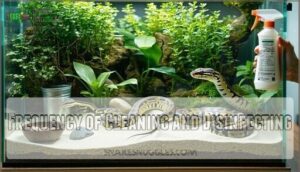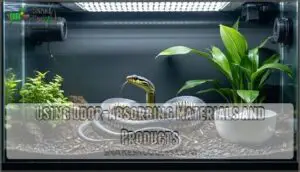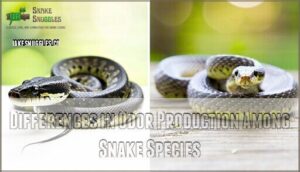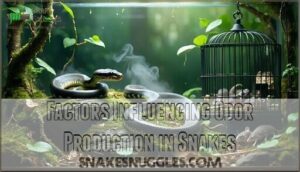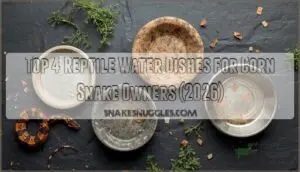This site is supported by our readers. We may earn a commission, at no cost to you, if you purchase through links.

Unlike dogs or cats, snakes lack sweat glands and fur that trap odors.
Most species stay virtually odor-free with basic maintenance.
Any bad smells usually come from dirty enclosures, not the snake itself.
When snakes do produce musk, it’s typically a stress response that happens rarely with proper handling.
Some species like garter snakes musk more than others, but even these remain clean with consistent care.
The key factors affecting odor include species type, enclosure cleanliness, and your snake’s health.
With weekly substrate changes and immediate waste removal, you’ll discover just how surprisingly clean these pets can be.
Table Of Contents
- Key Takeaways
- Pet Snakes and Odor Concerns
- Snake Biology and Hygiene
- Enclosure Maintenance and Odor Control
- Snake Species and Odor Variations
- Responsible Snake Ownership and Odor Management
- Frequently Asked Questions (FAQs)
- Do snakes smell?
- Does snake poop smell bad?
- Why does my snake smell?
- Does a snake vivarium smell?
- What does a snake tank smell like?
- What does a snake’s cage smell like?
- Can snakes transmit diseases through their odor or feces?
- How do I prevent my snake from getting skin infections?
- What are the signs of respiratory issues in pet snakes?
- Can I use air fresheners near my snakes enclosure?
- Conclusion
Key Takeaways
- You don’t need to worry about natural snake odor – properly cared for snakes are virtually odorless since they lack sweat glands and fur that trap smells like other pets.
- Clean enclosures prevent all smell issues – any bad odors come from dirty tanks, waste buildup, or poor ventilation rather than the snake itself.
- Weekly maintenance keeps things fresh – spot clean waste immediately, change substrate weekly, and ensure proper airflow to eliminate bacterial growth.
- Some species musk when stressed, but it’s rare – defensive musk only happens occasionally with proper handling, and species like ball pythons rarely produce any scent at all.
Pet Snakes and Odor Concerns
You’ve probably heard horror stories about smelly pet snakes, but these concerns are mostly myths.
Most pet snakes are actually among the cleanest, least odorous pets you can own when properly cared for.
With proper care, your pet snake stays surprisingly fresh and odor-free
Common Misconceptions About Snake Odor
If you’ve heard that snake smell bad, you’re dealing with Snake Myths rather than Odor Facts.
Healthy snakes rarely produce noticeable odors due to their unique Pet Hygiene characteristics.
Most pet snake odor concerns stem from poor enclosure maintenance, not natural Snake Behavior.
Unlike mammals, snakes lack fur and dander that trap smells. Musk Production only occurs when threatened, making reptile odor control surprisingly manageable with proper care.
Understanding snake species facts can also help dispel common misconceptions about snake odors and behaviors.
Factors Affecting Snake Odor
Several factors control your pet snake’s odor intensity. Understanding these helps you maintain a fresh-smelling environment.
Key factors affecting snake odor:
- Species Variation – Some snakes naturally produce more musk than others, with colubrids being more prone to musk release than pythons or boas.
- Enclosure Size and humidity levels – Poor ventilation and excess moisture create bacterial growth, while cramped spaces concentrate odors.
- Health and stress – Sick or stressed snakes release defensive musk more frequently, impacting overall reptile smell and requiring better pet snake care for effective odor control.
Proper temperature control methods can help minimize snake odor by reducing stress and maintaining a healthy environment.
Snake Diet and Its Impact on Odor
Your snake’s feeding habits directly affect snake odor.
Rodent diets create stronger scents than insect meals because prey items leave distinct smells.
Fish-eating snakes develop fishy odors, while egg-eating species stay nearly scentless.
Dietary changes can shift your reptile smell profile.
Smart pet snake care means understanding how different prey impacts odor control in your setup.
Importance of Proper Enclosure Maintenance
Your snake enclosure cleaning routine directly impacts odor control. A clean habitat prevents bacterial growth and waste buildup that creates unpleasant smells.
Here’s your maintenance action plan:
- Spot clean immediately when you find waste or uneaten food
- Replace substrate weekly or when soiled to maintain reptile hygiene
- Deep clean monthly with reptile-safe disinfectants for thorough snake hygiene
- Check ventilation systems regularly to confirm proper airflow
- Monitor humidity levels to prevent mold and bacterial growth
Snake Biology and Hygiene
You might be surprised to learn that snakes are actually among the cleanest pets you can own. Their unique biology makes them naturally odor-free compared to furry or feathered companions.
Snakes rank among the cleanest, most odor-free pets you can choose for your home
Snakes’ Unique Physiology and Odor Production
Unlike mammals, you won’t find sweat glands on snake scales.
Instead, these reptiles produce odor through specialized scent glands and skin secretions during their shedding cycle.
Most odorless species release minimal musk production, while others emit defensive scents when stressed.
| Physiological Feature | Odor Impact |
|---|---|
| Snake scales | No odor retention |
| Scent glands | Musk when threatened |
| Skin secretions | Minimal during shedding |
| Digestive system | Waste-related ammonia smell |
Proper substrate odor management prevents most reptile odor control issues you’ll encounter.
Snakes’ Grooming Habits and Cleanliness
You’ll be pleased to know that snakes maintain excellent personal hygiene without your help. Snake Shedding naturally removes dirt and parasites, keeping their Scale Maintenance perfect. Their smooth scales don’t trap odors like fur does. Skin Health stays healthy through regular molting cycles.
Here’s what makes snakes naturally clean:
- Periodic shedding removes bacteria and waste buildup
- Non-absorbent scales prevent odor retention
- Self-grooming behaviors keep them spotless
- Musk Reduction occurs when snakes feel secure
Smart Cage Hygiene prevents any snake odor issues. Clean substrates eliminate ammonia smell from snake waste. Regular cleaning snake cage routines guarantee your pet stays fresh. Snake smells disappear with proper enclosure care.
Comparison to Other Pets’ Odor
When comparing pet odor across different animals, snakes rank among the cleanest companions you can choose.
Dogs need regular baths and produce daily waste with strong scents. Cats require litter box maintenance and can develop lingering animal smells.
Hamsters and other small mammals create persistent odor from frequent urination. Birds generate feather dust and droppings that demand constant cleaning.
Reptile odor control proves simpler because snakes defecate only weekly and lack fur or feathers that trap scents.
Debunking The Myth of Snakes Being Dirty Animals
Many people wrongly believe reptiles are naturally dirty creatures. This Animal Myths stems from outdated thinking.
Pet snakes actually maintain excellent Snake Hygiene through regular shedding and minimal waste production. Their non-porous scales don’t trap odors like fur does.
With proper Reptile Care and Clean Enclosures, snake odor becomes virtually nonexistent, making reptile tank smell a rare issue.
Proper snake hygiene practices, including daily cleaning routines, are essential for maintaining a healthy and odor-free environment for pet snakes.
Enclosure Maintenance and Odor Control
You’ll be amazed how simple it’s to keep your snake’s home fresh and odor-free with the right maintenance routine.
Proper enclosure care prevents most smell issues before they start, making snake ownership much more pleasant for everyone in your household, with proper care being the key to a happy home.
Tips for Keeping a Clean and Odor-Free Enclosure
Proper substrate choice keeps your snake’s home fresh and odor-free. Use paper towels or reptile carpet instead of wood shavings.
Install ventilation tips like mesh lids for cross-ventilation. Apply odor control products safely around the snake enclosure.
Regular cleaning schedules and smart enclosure design prevent reptile tank smell before it starts. Choosing the right reptile carpet is essential for maintaining a clean and healthy environment.
Frequency of Cleaning and Disinfecting
Regular cleaning schedules keep your snake’s home fresh and odor-free.
You’ll want to stay on top of tank maintenance to prevent snake smells from building up.
Here’s your cleaning roadmap:
- Spot clean immediately when you notice waste or spilled water
- Deep clean weekly with reptile-safe disinfecting methods for complete sanitization techniques
- Replace substrate monthly to maintain proper odor control and prevent bacterial growth.
Consistent reptile cleaning prevents most snake odor issues before they start.
Your cleaning frequency depends on your snake’s size and eating habits, but weekly deep cleans work for most species.
Effective reptile care involves using a reptile cleaner to maintain a healthy environment.
Importance of Proper Ventilation and Temperature Control
Good air flow prevents stagnant conditions that breed bacteria and amplify snake odor.
Keep humidity between 30-50% and maintain steady temperatures around 75-85°F.
Poor ventilation systems trap moisture, creating perfect conditions for mold growth.
Temperature swings stress snakes, triggering defensive musk release.
Install fans or vents for consistent airflow—your nose will thank you later.
Properly designed reptile ventilation systems are essential for maintaining a healthy environment.
Optimal Enclosure Setup Reptile Health Risks
Using Odor-Absorbing Materials and Products
Beyond proper ventilation, odor absorbers become your best defense against snake odor.
Smart substrate choices and targeted products keep your reptile’s space fresh.
Here are four proven odor control methods:
- Activated charcoal filters – Place near ventilation areas for continuous air purification
- Baking soda treatments – Sprinkle lightly under substrate to neutralize animal smells naturally
- Absorbent substrates – Choose cypress mulch or paper towels over cedar shavings
- Commercial scent removers – Use reptile-safe air purifiers designed for odor neutralizers
These solutions target smell at its source.
Proper snake enclosure setup is also essential for maintaining a clean and odor-free environment.
Snake Species and Odor Variations
Not all snake species produce the same amount of odor, and understanding these differences helps you choose the right pet for your home.
Some snakes naturally smell less than others due to their biology, diet, and behavior patterns.
Differences in Odor Production Among Snake Species
Not all snake species produce the same level of snake musk or odor.
Species comparison reveals significant odor variance – ball pythons rarely musk and stay nearly scentless, while corn snakes frequently release defensive musk when handled.
Snake diet also affects smell: fish-eating garter snakes carry a fishy aroma, but rodent-eating pythons remain odorless between meals.
Musk production varies dramatically across snake species, making careful selection important for reptile odor control.
Understanding snake smell characteristics is vital for identifying potential snake presence and taking appropriate action.
Factors Influencing Odor Production in Snakes
Understanding what affects snake smell helps you manage your pet’s odor effectively.
Snake Diet directly impacts scent intensity—rodent-eating species produce stronger odors than egg-eaters.
Musk Production varies by species, with colubrids releasing defensive musk more frequently than pythons.
Environmental Impact matters too: humidity, ventilation, and enclosure cleanliness influence reptile odor control.
Odor Genetics and Species Variation mean some snakes naturally produce less animal smells than others.
Examples of Snake Species With Unique Odor Characteristics
Different snake species produce distinct smells that vary widely in intensity and character. Python Smell tends to be minimal, while Colubrid Scents can be quite noticeable.
Understanding these snake species differences helps you choose the right pet for your situation.
Here are notable odor characteristics by snake behavior:
- Ball pythons – Nearly odorless with minimal Musk Intensity when properly cared for
- Corn snakes – Sweet, earthy aroma but frequent musking when stressed
- Boa Odors – Leather and hay-like scent, less frequent waste production
- Garter snakes – Strong fishy aroma, especially when threatened or handled
- Kingsnakes – Pungent musk release, though Diet Influence affects overall smell intensity
Snakes’ unique odor characteristics can be better understood by studying their snake characteristics guide.
How to Research and Choose a Low-Odor Snake Species
Before choosing your pet snake, you’ll want to research low-odor snake species through reputable sources like breeder reviews and reptile forums.
Compare odor profiles across different breeds—ball pythons and rosy boas consistently rank as low odor breeds with excellent pet suitability.
Focus on species comparison data regarding musking frequency and waste production.
Proper snake research makes certain your chosen pet snakes align with your reptile odor control needs and snake care capabilities.
Responsible Snake Ownership and Odor Management
As a responsible snake owner, you’ll find that preventing odors starts with understanding your pet’s basic needs and maintaining consistent care routines.
Regular monitoring and prompt attention to any unusual smells will keep both you and your snake comfortable in a fresh, healthy environment, which is key to a happy and healthy relationship.
Best Practices for Snake Care and Odor Prevention
Proper snake care keeps odors at bay.
You’ll want to focus on three key areas that make all the difference:
- Tank Maintenance: Clean waste immediately and replace substrate monthly.
- Snake Nutrition: Feed frozen-thawed prey on schedule.
- Snake Hygiene: Maintain proper humidity levels and ventilation.
Use newspaper or reptile carpet for easy cleanup and better odor control.
Remove uneaten food within 24 hours to prevent bacterial growth and smells.
Good airflow prevents moisture buildup that leads to mold and odors.
Follow these cleaning tips consistently for effective reptile odor control.
Monitoring and Addressing Odor Issues in Snakes
In regards to odor detection, your nose is your best early warning system.
Check your snake’s enclosure daily for unusual smells that signal problems. Snake musk releases happen when your pet feels stressed, but persistent animal smells need immediate attention.
Strong or unfamiliar odors often indicate reptile odor control issues, health problems, or enclosure cleaning needs.
Document smell musk patterns to identify triggers.
Sudden snake smell changes require quick action – remove waste, check for retained shed, and make certain proper snake hygiene.
Consistent monitoring prevents small odor issues from becoming major headaches.
Importance of Regular Veterinary Check-Ups
Preventive medicine forms the cornerstone of responsible snake ownership.
Regular veterinary checkups help you catch health issues before they become serious problems that could affect your snake’s wellbeing.
Essential veterinary care includes:
- Annual wellness exams to monitor snake health and detect early warning signs
- Fecal testing for parasites that can cause digestive issues and odors
- Professional guidance on proper husbandry and preventive medicine practices.
Early detection saves money and keeps your pet healthy.
Frequently Asked Questions (FAQs)
Do snakes smell?
Snakes don’t naturally smell bad. Their smooth, non-absorbent scales don’t retain odors like fur. You’ll only notice smells from waste or defensive musk when they’re stressed or threatened.
Does snake poop smell bad?
Most snakes defecate only 1-2 times weekly, but yes, their waste does smell.
You’ll notice a stronger, earthier odor than typical pet waste.
However, regular spot-cleaning keeps odors manageable since snakes produce less frequent waste than other pets.
Why does my snake smell?
Your snake’s smell likely comes from musk (defensive liquid), waste, or poor enclosure hygiene. Clean the tank regularly, remove uneaten food promptly, and make certain proper ventilation to eliminate odors.
Does a snake vivarium smell?
Surprisingly, 75% of snake owners worry about vivarium odors unnecessarily.
Your snake vivarium won’t smell if you maintain proper cleaning habits.
Clean substrate regularly, remove waste promptly, and guarantee adequate ventilation for odor-free success.
What does a snake tank smell like?
A properly maintained snake tank shouldn’t smell at all. You’ll notice neutral, earthy scents only when close. Poor cleaning creates musty, ammonia-like odors from waste buildup.
What does a snake’s cage smell like?
Unlike a musty basement, well-maintained snake cages smell surprisingly neutral. You’ll notice minimal odor from healthy snakes themselves—just earthy, clean scents.
Poor maintenance creates waste buildup and musty smells requiring regular cleaning.
Can snakes transmit diseases through their odor or feces?
Healthy pet snakes don’t transmit diseases through their odor alone. However, you can catch salmonella from handling contaminated feces without proper hygiene. Always wash hands after cleaning.
How do I prevent my snake from getting skin infections?
Picture your snake’s skin as delicate armor that needs constant care.
Maintain proper humidity levels, guarantee clean water, use appropriate substrate, and keep temperatures consistent.
Regular enclosure cleaning prevents bacterial growth that causes infections and is crucial for maintaining a healthy environment, with proper care being essential to prevent such issues.
What are the signs of respiratory issues in pet snakes?
Watch for wheezing, mouth breathing, excessive mucus around nostrils, stretching neck upward, open-mouth breathing, and lethargy. You’ll notice these symptoms worsen during stress or handling situations.
Can I use air fresheners near my snakes enclosure?
You shouldn’t use air fresheners near your snake’s enclosure.
They contain chemicals that can harm your snake’s respiratory system.
Instead, focus on regular cleaning and proper ventilation to control odors naturally.
Conclusion
Despite concerns about reptile hygiene, do pet snakes smell bad?
Not when properly cared for.
Snakes naturally produce minimal odor since they lack sweat glands and fur that trap smells.
Any offensive odors typically stem from dirty enclosures, not the animals themselves.
With consistent cleaning, appropriate substrates, and proper ventilation, you’ll maintain an odor-free environment.
Regular waste removal and weekly substrate changes prevent bacterial buildup that causes unpleasant smells.
Your snake will remain virtually scentless with proper care.
- https://www.reddit.com/r/snakes/comments/10a8pcc/do_snakes_stink/
- https://ball-pythons.net/forums/showthread.php?251098-Least-smelly-snake-breeds-%28Are-Colubrids-off-the-table-%29
- https://www.cornsnakes.com/forums/threads/my-snake-kinda-stinks.96874/
- https://ourreptileforum.com/community/threads/unusual-odor-from-my-snake.27501/
- https://community.morphmarket.com/t/getting-rid-of-smell-potentially-from-snake/52885



